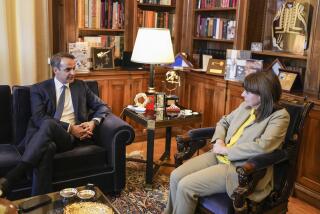Greek Prime Minister Fighting for Political Life : After Charges Backfire, Papandreou in Danger of Losing Close Election Today
- Share via
ATHENS — After ruling Greece for almost four years in its first-ever leftist government, Prime Minister Andreas Papandreou is fighting for his political life today in a national election that forecasters find too close to call.
Both the enigmatic and often erratic prime minister and his chief opponent, Constantine Mitsotakis of the center-right New Democracy Party, predict that they will win comfortably. Most political analysts, though, said the race will be tight, with neither Papandreou’s Panhellenic Socialist Movement (PASOK) nor New Democracy winning a clear majority in Parliament.
Several Greek political commentators said that unless one of the two wins a surprise landslide, the country will face a period of political instability with the likelihood of another round of elections within six months.
Alternatively, they said, Papandreou could patch together a coalition with the small but significant Moscow-leaning Communist Party. That would give the hard-line Communists their first entree to a West European government since French President Francois Mitterrand invited them to play a minor role after his election in 1981.
Even that would be unlikely to last long, though, due to the nature of Papandreou’s movement, a broad assemblage ranging from the Marxist-left to the center of the political spectrum that has been held together largely by the feisty prime minister’s personality.
‘Expect Better’
For Papandreou himself, an indecisive election result, or worse, an outright defeat, could be politically fatal if it triggers a breakdown of the diverse Socialist group that swept him to power with an absolute majority in 1981.
The unpredictable prime minister, whose sharp-tongued outbursts and Third World anti-imperialist rhetoric have dismayed the United States and Greece’s European allies, conducted an election campaign that bewildered many observers here because of what one called “its lack of focus and sheer demagoguery.”
“It was the most vulgar election campaign I’ve ever witnessed,” said Costas Caligas, one of the country’s leading political columnists, who writes for the conservative Kathemerini newspaper. “One would expect something better from a man of his intellectual background.”
Papandreou, a former Berkeley economics professor with a doctorate from Harvard, sounded more like an old-fashioned American populist than an intellectual as he stumped the country vilifying his opponent, Mitsotakis, with probably false characterizations such as “friend of the (Nazi) SS,” and “wandering Jew.”
When the name-calling appeared to backfire--Mitsotakis was a hero of the World War II resistance on his native island of Crete--Papandreou shifted to a less strident tone, sometimes subdued and defensive, as he blamed past New Democracy governments for Greece’s current economic ills, which include Europe’s worst inflation rate, high unemployment and rapidly growing foreign debt.
Rightfully, he took credit for increasing wages and pensions and improving national health care during his almost four years in office, and in one of his few references to foreign affairs during the campaign, he defended his go-it-alone approach to the United States and the Atlantic Alliance.
“We want a free country without protectors, proud and sovereign. That’s why we signed an agreement to dismantle U.S. bases on our soil,” he told a crowd in Athens’ Constitution Square in his final campaign speech Friday night.
Actually, the Papandreou government signed a five-year lease agreement in 1983 with the United States which contains no dismantling language, according to American officials, despite the 67-year-old prime minister’s frequent assertions to the contrary.
Whatever the outcome of today’s voting, Papandreou is likely to remain an enigma to many Greeks, including some who formerly were his closest friends.
Greek-born fellow professors at the University of Minnesota, Northwestern and Berkeley, where the then-American citizen Papandreou headed the Economics Department, describe him during his more than 20 years in the United States as a relatively mild-mannered professional, seemingly intent on putting his Greek past behind him.
Defense of Capitalism
As an enlisted man in the American Navy for a brief period during World War II, he performed routine, noncombatant stateside tasks, and as a student and professor on American campuses he did nothing politically more radical than join the American Civil Liberties Union.
A former Berkeley colleague who is familiar with all of Papandreou’s considerable published work in his specialty of econometrics said that his books and articles amount mostly to a defense of American-style capitalism, with no hint of the anti-Americanism and anti-capitalism that he espouses today.
Divorced from a psychiatrist wife at Harvard, Papandreou married Margaret Chant, once chosen the American Legion’s All-American Girl in her native Elmhurst, Ill. Old friends say that it was she who persuaded him to return to Greece, renounce his American citizenship and enter politics in the early 1960s. The Papandreous have four U.S.-born children, one of whom, George, 32, the oldest of three sons, is a member of the Greek Parliament, representing his father’s party.
Soon after Papandreou’s return, his father, George Papandreou, became prime minister of Greece and brought Andreas into his Cabinet as perhaps the most powerful of his advisers.
Several friends who returned to Greece with him to establish the country’s first economics research center said that it was at this point that the formerly mild-mannered but socially exuberant Papandreou turned radical, leading his prime minister father into a politically damaging confrontation with then-King Constantine and the United States.
The blow-up, for which they still blame the rashness of Andreas, led a large number of George Papandreou’s political associates, including Mitsotakis, to abandon his Center-Union party, which led to the collapse of the elder Papandreou’s government. After a period of instability, the coup of the Greek colonels less than two years later began seven years of cruel dictatorship.
Today, Papandreou blames Mitsotakis for creating the conditions that led to the dictatorship and calls him a traitor; Mitsotakis blames Papandreou for provoking the crisis in the first place.
The lingering bitterness is said by both present and former associates of Papandreou to explain the personal mud-slinging that characterized the monthlong campaign leading to today’s election.
More to Read
Sign up for Essential California
The most important California stories and recommendations in your inbox every morning.
You may occasionally receive promotional content from the Los Angeles Times.













